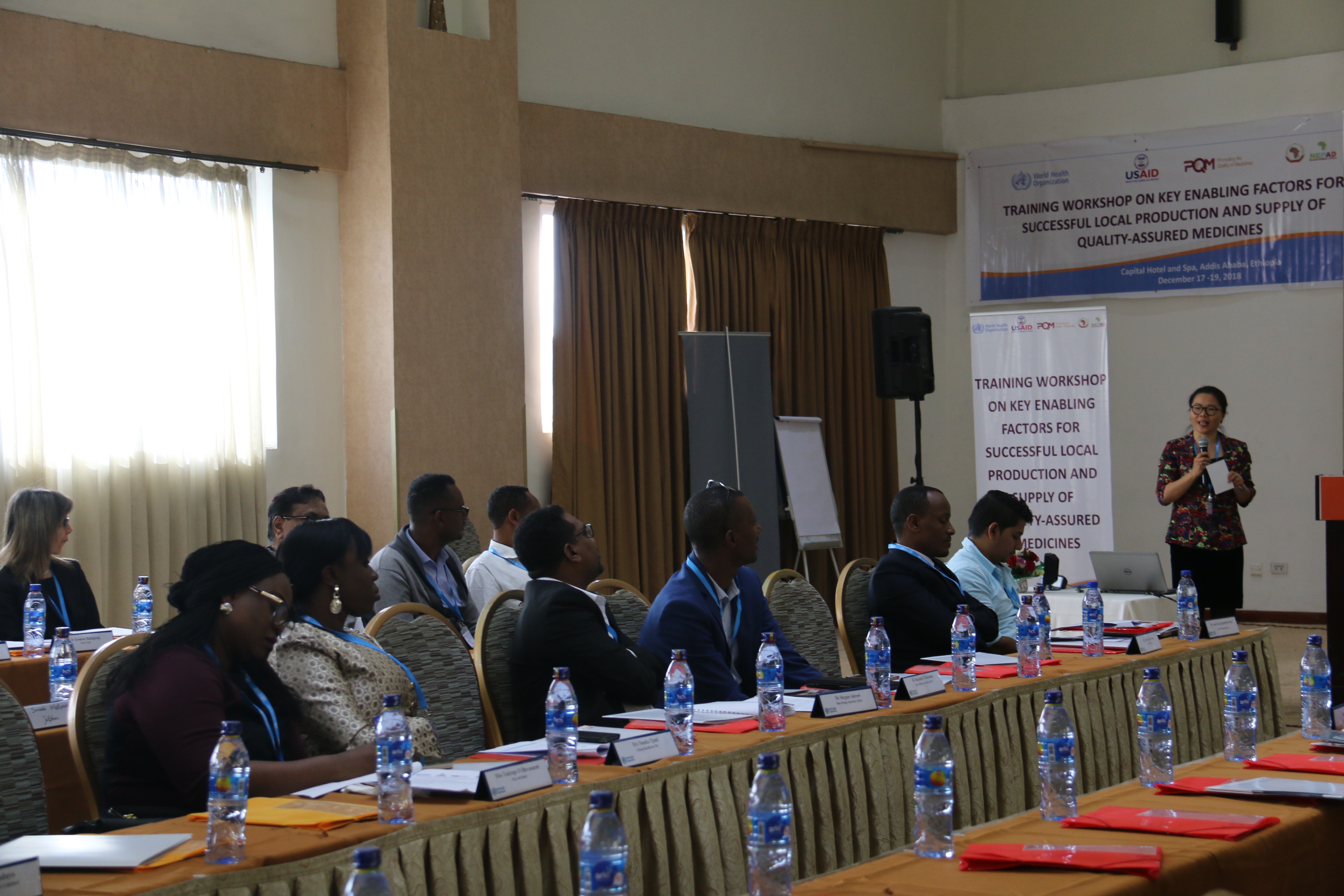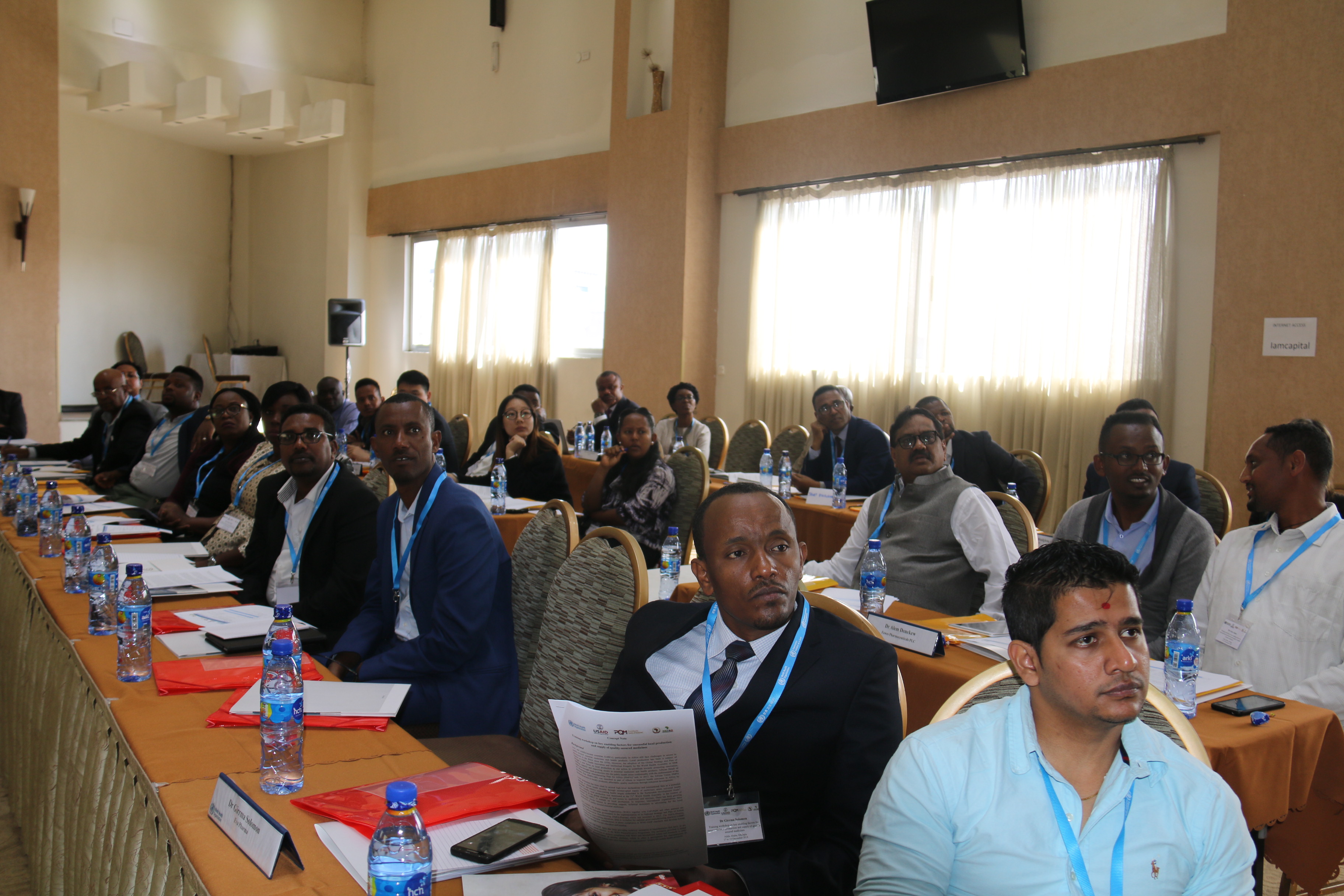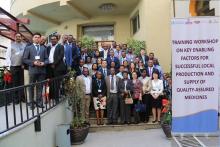Advancing local production and supply of quality assured medicines to improve access in the Africa region
20 December 2018, Addis Abeba | An international training workshop on “Key enabling factors for successful local production and supply of quality-assured medicines” started on Monday 17 December 2018 in Addis Ababa, Ethiopia. WHO in collaboration with USP/PQM and NEPAD organized this three days training workshop that took place from 17-19, December 2018 with a support by WHO Ethiopia to benefit pharmaceutical manufacturing companies based in the Africa region.



The training aims to provide training and guidance to manufacturers and other participants on key business, policy, regulatory and other factors critical to successful local production of essential medicines.
Dr. Jicui Dong, Programme Manager for Local Production, WHO Head Quarter, opened the workshop with a video address by WHO Director General Dr. Tedros Adhanom Ghebreysus, wherein there are three ingredients to successful reliable supply of quality, locally-produced medicines to increase access: an overarching government strategy and plan; strong regulatory systems that ensure quality and safety, and an enabling business environment to build the knowledge and skills of the pharmaceutical industry.
The training aims to provide training and guidance to manufacturers and other participants on key business, policy, regulatory and other factors critical to successful local production of essential medicines.
Dr. Jicui Dong, Programme Manager for Local Production, WHO Head Quarter, opened the workshop with a video address by WHO Director General Dr. Tedros Adhanom Ghebreysus, wherein there are three ingredients to successful reliable supply of quality, locally-produced medicines to increase access: an overarching government strategy and plan; strong regulatory systems that ensure quality and safety, and an enabling business environment to build the knowledge and skills of the pharmaceutical industry.
Speaking on the opening session of the training workshop, Dr Paul Mainuka representing the WHO country office said “Access to safe, affordable and good quality medicines, vaccines and other health technologies is one of the key elements of access to quality health service and thereby to Universal Health Coverage.”
“The country still imports more than 85% of its demand for medicines from foreign sources.” said Ms Heran Gerba, Deputy Director General of Ethiopian Food Medicine and Healthcare Administration and Control Authority (EFMHACA). She added that “Despite the major progress made to improve the health status of the population in the last couple of decades, the health status of Ethiopia remains relatively poor; and the pharmaceutical manufacturing industry as well is still in its nascent stage and has yet to be commensurate to the local demand.” Ms Heran also appreciated the tremendous support the organizers of this workshop have been offering throughout the development and implementation of the National Strategy and Plan of Action for Pharmaceutical Manufacturing in Ethiopia (NSPA-Pharma).
“The country still imports more than 85% of its demand for medicines from foreign sources.” said Ms Heran Gerba, Deputy Director General of Ethiopian Food Medicine and Healthcare Administration and Control Authority (EFMHACA). She added that “Despite the major progress made to improve the health status of the population in the last couple of decades, the health status of Ethiopia remains relatively poor; and the pharmaceutical manufacturing industry as well is still in its nascent stage and has yet to be commensurate to the local demand.” Ms Heran also appreciated the tremendous support the organizers of this workshop have been offering throughout the development and implementation of the National Strategy and Plan of Action for Pharmaceutical Manufacturing in Ethiopia (NSPA-Pharma).
The training was attended by chief executive officers (CEOs), managing directors, business development managers, technical managers in production, regulatory affairs and attendees from other related areas. During the training, presentations on relevant topic designed for these specific participants were covered and group discussions held on experience sharing to reinforce learning. The training enabled the participants to build their knowledge and share the experience among countries; and invited feedback on manufacturers’ needs for capacity building.
Participants from the regional and national pharmaceutical associations in Africa, representatives from the regional economic communities (REC) for health, government ministries and agencies such as the Ministry of health, Ministry of Industry and the National regulatory authority will also benefit from this training.
Participants from the regional and national pharmaceutical associations in Africa, representatives from the regional economic communities (REC) for health, government ministries and agencies such as the Ministry of health, Ministry of Industry and the National regulatory authority will also benefit from this training.
Low- and middle-income countries (LMICs), particularly in Africa still face challenges in access to quality-assured essential medicines and health products. Poor-quality medicines undermine the treatment of some of the world’s most pressing diseases, such as tuberculosis, malaria, and HIV/AIDS, and potentially contribute to anti-microbial resistance. The risk is greatest in low- and middle-income countries like Ethiopia.
Thus, ensuring access to affordable and safe medicines through local production has become a top priority and strategic national agenda in Ethiopia. Currently, the Ministry of Health and Industry in collaboration with WHO and other developmental partners, developed and started implementing the National Strategy and Plan of Action for Pharmaceutical Manufacturing Development in Ethiopia (NSPA-Pharma).
For further information, please contact:
Dr. Jicui Dong, Programme Manager for Local Production, Regulatory Systems Strengthening, Regulation of Medicines and other Health Technologies, email: dongj [at] who.int (dongj[at]who[dot]int)
For further information, please contact:
Dr. Jicui Dong, Programme Manager for Local Production, Regulatory Systems Strengthening, Regulation of Medicines and other Health Technologies, email: dongj [at] who.int (dongj[at]who[dot]int)
Dr Paul mainuka, mainukap [at] who.int (mainukap[at]who[dot]int)
Mengistab Teferi, teferim [at] who.int (teferim[at]who[dot]int)
Kedir Tahir Hagos, kediro2 [at] yahoo.com (kediro2[at]yahoo[dot]com)
Mengistab Teferi, teferim [at] who.int (teferim[at]who[dot]int)
Kedir Tahir Hagos, kediro2 [at] yahoo.com (kediro2[at]yahoo[dot]com)



